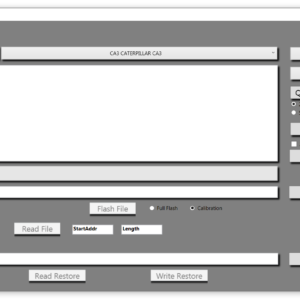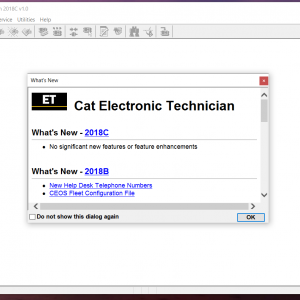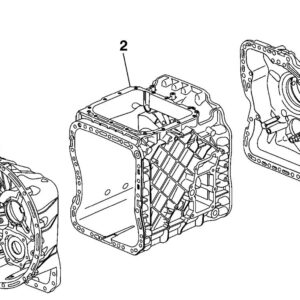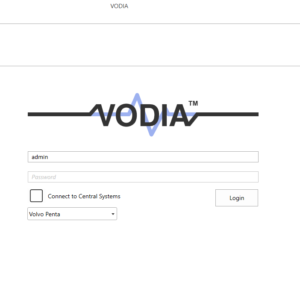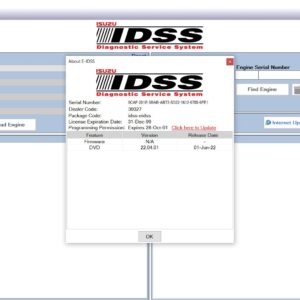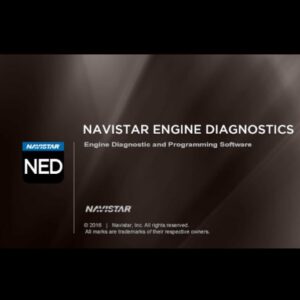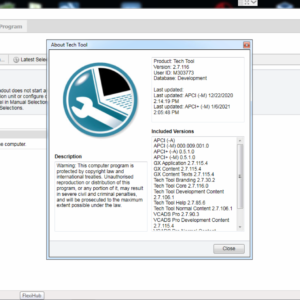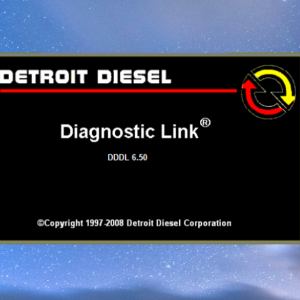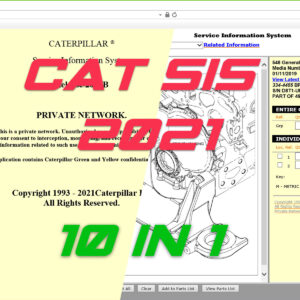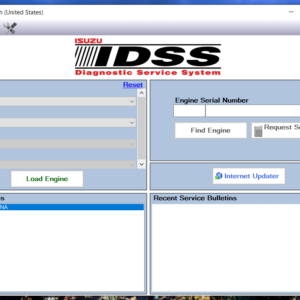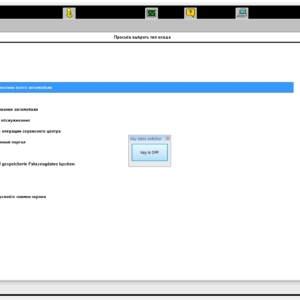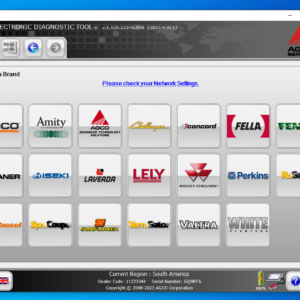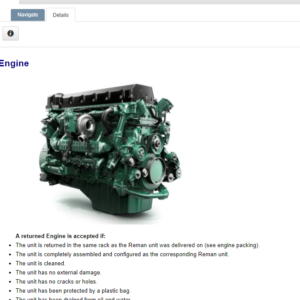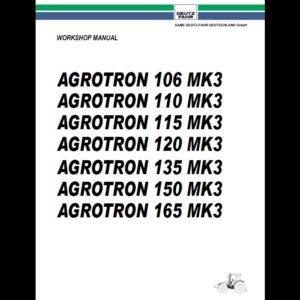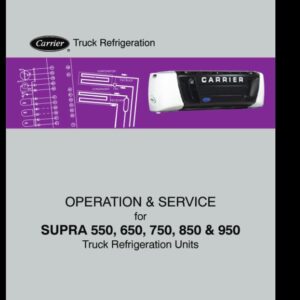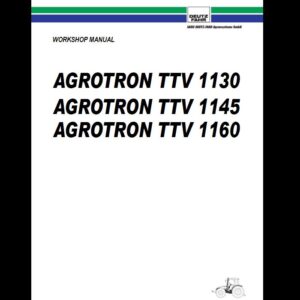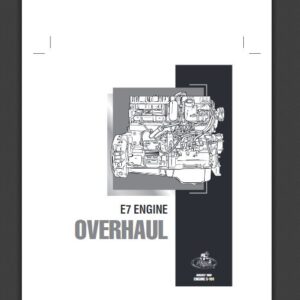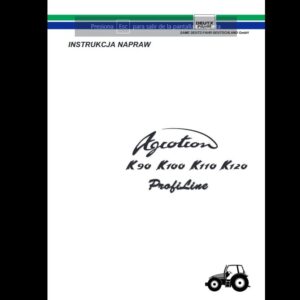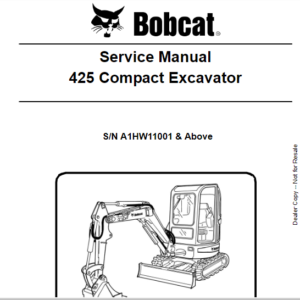Cummins X15 CM2350 X116B Performance Series (2018 & Newer) Fault Code: 6783 PID: SPN: 4766 FMI: 2/21 Aftertreatment 1 Diesel Oxidation Catalyst Outlet Gas Temperature Sensor – Data Not Rational – Drifted Low
Lamp:
None
Reason:
An offset in the diesel particulate filter intake temperature sensor reading has been detected.
Effect:
Possible reduced engine performance.
Circuit Description:
The aftertreatment exhaust gas temperature sensor module is a smart device that communicates with the engine control module via the J1939 data link. The aftertreatment exhaust gas temperature sensor module performs its own internal diagnostics and reports malfunctions back to the engine control module using the J1939 data link. The aftertreatment exhaust gas temperature sensor module is used to measure the aftertreatment diesel oxidation catalyst intake temperature, aftertreatment diesel particulate filter intake temperature, aftertreatment diesel particulate filter outlet temperature, and aftertreatment SCR outlet temperature. The temperature probes are permanently attached to the aftertreatment exhaust gas temperature sensor module and can not be replaced individually.
Component Location:
The aftertreatment diesel particulate filter intake temperature sensor is located in the aftertreatment system. It is located at the outlet of the diesel oxidation catalyst and before the diesel particulate filter.
Conditions for Running the Diagnostics:
This diagnostic runs continuously when the keyswitch is in the ON position and the engine is running.
Conditions for Setting the Fault Code:
The Engine Control Module (ECM) detected the difference between the aftertreatment diesel particulate filter intake temperature sensor data and diesel particulate filter outlet temperature sensor data did not match the expected value for the present engine operating conditions.
Action Taken When the Fault Code is Active:
1. The ECM illuminates the amber check engine lamp and/or malfunction indicator lamp (MIL) after the diagnostic fails on two consecutive trips.
2. A default value for the aftertreatment diesel particulate filter intake temperature reading is used.
3. Diesel exhaust fluid injection into the aftertreatment system is disabled.
4. Engine torque will be reduced if the engine is operated for an extended period of time with this fault active.
Conditions for Clearing the Fault Code:
1. To validate the repair using a diagnostic road test, utilize a route that incorporates both stop and go city type driving and steady state highway type driving. It may be necessary to load the unit for certain diagnostics in the ECM to run.
2. To validate the repair using a chassis dynamometer, utilize a routine that incorporates acceleration and motoring events, steady state highway type operation, and load. This will simulate normal driving and allow the diagnostics in the ECM to run.
3. The fault code status displayed by the recommended diagnostic tool or equivalent will change to inactive immediately after the diagnostic runs and passes.
4. The ECM will turn off the amber check engine lamp immediately after the diagnostic runs and passes.
5. For On-Board Diagnostics (OBD) engines, the ECM will extinguish the Malfunction Indicator Lamp (MIL) after three consecutive trips where the diagnostic runs and passes.
6. The “reset all faults” command in the recommended diagnostic tool or equivalent can be used to clear active and inactive faults, as well as extinguish the MIL for OBD applications.
Shop Talk:
Possible causes of this fault code include:
1. A malfunctioning aftertreatment diesel particulate filter intake temperature sensor.
2. A malfunctioning aftertreatment diesel particulate filter outlet temperature sensor.
3. Reference the appropriate OEM wiring diagram when troubleshooting circuits that utilize wiring supplied by the OEM.
4. For intermittent power supply and datalink communication issues with aftertreatment components, it is highly recommended that the OEM dower Distribution center fuses and relays be thoroughly checked for loose, missing or intermittent connections.
-
Scania SDP3 2.48.6 Diagnosis & Programming for VCI 3 VCI3 without Dongle
Scania $30.00Rated 0 out of 5
-
DETROIT DDDL 8.14 SP3 – Detroit Diesel Diagnostic Link 8.14 SP3 2021 ( 1PC )
Detroit $73.00Rated 0 out of 5 -
VOLVO PREMIUM TECH TOOL PTT 2.7.116 + APCI 2021 + devtool ( ONLINE )
Trucks software $80.00Rated 0 out of 5 -
10 IN 1 FOR CAT SIS Caterpillar 2021 Full Service Dealer INCLUDING CAT 2019 C
CAT $110.00Rated 0 out of 5 -
VOLVO PREMIUM TECH TOOL PTT 2.7.30 Developer + Devtool + INSTALATION VIDEO!
Trucks software $60.00Rated 0 out of 5 -
download MANCATS II v14.01 2014 Diagnostic software MAN CATS ( virtual machine )
MAN $75.00Rated 0 out of 5 -
Hino Diagnostic eXplorer 2 – Hino DX2 v1.1.21.4 with keygen unlocked ( Hino trucks )
Hino $60.00Rated 0 out of 5
Related products
-
Allison 1000 & 2000 Gen 4 Fault Codes: P0876 Transmission Reverse Pressure Switch Circuit Stuck Open
1000 & 2000 Gen 4 $50.00Rated 0 out of 5 -
Allison 1000 & 2000 Gen 4 Fault Codes: P2773 Torque Control Request Ignored – ECM/TCM
1000 & 2000 Gen 4 $50.00Rated 0 out of 5 -
Allison 1000 & 2000 Gen 4 Fault Codes: P0218 Transmission Fluid Over Temperature Condition
1000 & 2000 Gen 4 $50.00Rated 0 out of 5 -
Allison 1000 & 2000 Gen 4 Fault Codes: P0873 Transmission Pressure Switch Solenoid E Circuit High
1000 & 2000 Gen 4 $50.00Rated 0 out of 5 -
Allison 1000 & 2000 Gen 4 Fault Codes: P0847 Transmission Pressure Switch Solenoid D Circuit Stuck Closed
1000 & 2000 Gen 4 $50.00Rated 0 out of 5 -
Allison 1000 & 2000 Gen 4 Fault Codes: U0032 J1850 (Class 2) Serial Data Communication Link High
1000 & 2000 Gen 4 $50.00Rated 0 out of 5 -
Allison 1000 & 2000 Gen 4 Fault Codes: U1064 J1850 (Class 2) TBC Controller State of Health Failure
1000 & 2000 Gen 4 $50.00Rated 0 out of 5 -
Allison 1000 & 2000 Gen 4 Fault Codes: P2771 Four-Wheel Drive Switch Circuit
1000 & 2000 Gen 4 $50.00Rated 0 out of 5 -
Allison 1000 & 2000 Gen 4 Fault Codes: P0871 Transmission Pressure Switch Solenoid E Circuit Stuck Open
1000 & 2000 Gen 4 $50.00Rated 0 out of 5 -
Allison 1000 & 2000 Gen 4 Fault Codes: U1041 J1850 (Class 2) ABS Controller State of Health Failure
1000 & 2000 Gen 4 $50.00Rated 0 out of 5 -
Allison 1000 & 2000 Gen 4 Fault Codes: P1688 Unmanaged Engine Torque Delivered To TCM Signal
1000 & 2000 Gen 4 $50.00Rated 0 out of 5 -
Allison 1000 & 2000 Gen 4 Fault Codes: U1096 J1850 (Class 2) IPC Controller State of Health Failure
1000 & 2000 Gen 4 $50.00Rated 0 out of 5 -
Allison 1000 & 2000 Gen 4 P0719 Brake Switch ABS Input Low
1000 & 2000 Gen 4 $50.00Rated 0 out of 5 -
Allison 1000 & 2000 Gen 4 Fault Codes: P0846 Transmission Pressure Switch Solenoid D Circuit Stuck Open
1000 & 2000 Gen 4 $50.00Rated 0 out of 5 -
Allison 1000 & 2000 Gen 4 Fault Codes: P1779 Engine Torque Delivered To TCM Signal
1000 & 2000 Gen 4 $50.00Rated 0 out of 5

